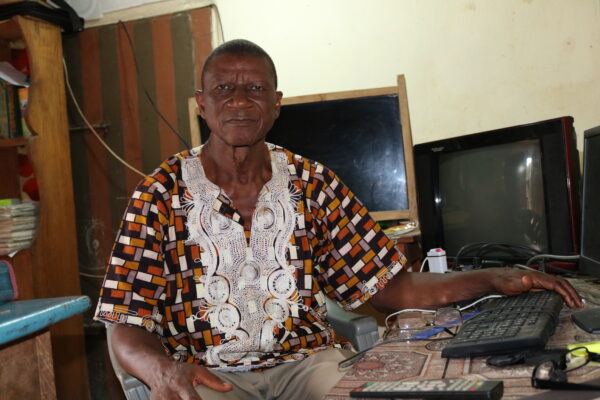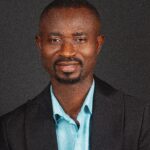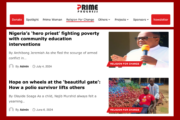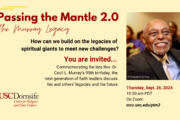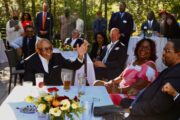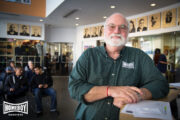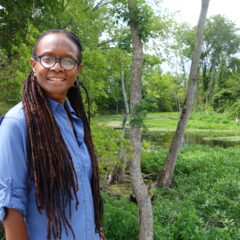This article was originally published in TRTWorld, with the support of CRCC’s global project on engaged spirituality.
It is an old story, 19 years old in fact.
In 2000, on May 26, Sierra Leone’s capital Freetown went wild with jubilation when 87 haggard-looking children arrived in the city.
Then, the country was embroiled in a civil war and the children who had just arrived were former sex slaves and child soldiers forced to fight for rebel forces. They escaped from Makeni, a city in the country’s Northern Province that was controlled by the rebels who wanted to retain the children.
Edmund Kaszibuloh Koroma was the man behind the miraculous escape. He risked his life and those of his family, defying the rebels’ threats and leading the children through bush paths on a journey of about 120 miles that lasted for five days.
What is new, however, is fresh details about Koroma’s motivation and his after-war humanitarian sacrifices for former child combatants and children from poor homes.
‘Two in one’
As I journeyed from Nigeria to Sierra Leone to meet and interview Koroma in Makeni, I anticipated meeting a serious-looking man with a go-straight-to-the-point discipline.
I was wrong.
The calm, jovial man stood six feet tall at least with a marked friendliness and cheerfulness and a smile seem almost permanently plastered on his face.
Not long after we met, Koroma offered me a walk around. We talked and laughed as we sauntered for about 20 minutes from his office at Mess Road to Clock Tower – a public square built elliptically with two gigantic clocks placed sideways to mark the city’s center.
Particularly, I noticed that almost every two to three minutes, shouts of either “Uncle”, “Okame” (my own), or “Kaszibuloh” were directed towards us from youth and older adults.
Koroma stopped regularly, waved and returned greetings before turning his attention back to me.
“I cannot walk like this without them greeting me repeatedly,” he said. “I cherish it and I must stop to pay them respect too.”
But referring to his close friends and associates, he said:
“They call me ‘two in one.'”
It is a phrase used jokingly to imply that Koroma is part Muslim and part Christian.
Though a devout Catholic and Chairman of the Catholic community in Makeni whose initiative led to the creation of the Catholic Young Men Association years ago, Koroma sometimes attends prayers at mosques and other Islamic functions. He believes both religions are only divided in administration but are in worship of one undivided God. His demonstration of religious tolerance earned him membership of the Inter-religious Council in Makeni where he plays a unifying role among followers of the two major faiths.
Two journeys to nowhere
Koroma’s experience with Islam and Catholicism began very early.
Four years after he was born in 1954, his Muslim father, Alpha Koroma, took him 78 kilometres from home and left him at the Sierra Leone Muslim Brotherhood (SLMB) – a Qur’anic school in the Northern Province’s Port Loko district.
The older Koroma wanted his young son to become an imam, the reason he left him at the SLMB to grow in Islamic knowledge and attain primary education simultaneously.
Koroma completed primary school at age 11 and returned home after spending seven years at the SLMB. During that period, he lost his father who was his major motivation. That turn of events gradually killed every interest Koroma had in fulfilling his father’s wish and becoming an imam.
It also marked the beginning of another religious exodus.
When Koroma turned 12, he was one of several children picked by Roman Catholic missionaries to begin secondary education at St. Francis, a mission school in Makeni.
He soon converted to Christianity at the school and once he finished secondary education, he began pre-major and major seminary training that saw him traveling to Nigeria, Ghana, and Liberia – a path to becoming a Catholic priest.
But again, just after completing his theology and philosophy studies, before he could be ordained a priest, a new incurable passion possessed Koroma and he decided to end his journey towards priesthood.
His new affection was to educate and counsel children as a teacher in a conventional academic setting.
Koroma acquired a bachelor’s degree from Sierra Leone’s Northern Polytechnic, qualifying as a teacher and psychosocial counsellor. He went on to teach and head several schools in Makeni – including his alma mater, St. Francis.
However, beyond the classroom, this religious mingling succeeded in molding him into something else, a risk-taking and sacrificial humanitarian.
At the Qur’anic school and the Catholic seminary, teachings around charity, self-sacrifice, love for humanity and tolerance built his early inspiration to work for social good.
“This is how my life has been trained,” he joshed.
His first move into humanitarian work was when he, alongside some colleagues, created a group called Working for Peace, through which they engaged young people to work for community development and stability.
High points
With its 7.9 million-strong population and location on the shores of the Atlantic Ocean in West Africa, Sierra Leone has experienced some fatal periods and Koroma always presented himself a ready servant to help where he could.
At least 50,000 people died in its 11-year civil war, which began in 1991 when the Revolutionary United Front (RUF), a rebel group, made a failed bid to overthrow the government of President Joseph Momoh.
By 1999, when the new government of President Ahmad Tejan Kabbah struck a peace deal with the RUF, nearly half of the rebel army was forcefully-conscribed children.
The peace period allowed Caritas – a charity of the Roman Catholic Church – to set up an Interim Care Center (ICC) in Makeni where about 450 retrieved former child soldiers and sex slaves were undergoing rehabilitation and education.
Koroma was the manager of the ICC.
In May 2000, the rebels reneged on the peace agreement and went back to fighting after UN troops refused to hand over 10 former rebels to RUF’s leadership. They had embraced disarmament and surrendered their weapons at a UN-run disarmament location in the Northern Province without the authorisation of the RUF. The armed group invaded the ICC, took away over 40 children, threatening to return for more.
To protect the remaining children, Koroma started sending them in tranches of five and 10 to government-controlled Freetown by hiding them in trucks en route.
Soon, vehicular movement stopped as the war grew fierce. Eighty-seven children were still at the ICC. That was how Koroma dashed to the jungle with them, hiding from the rebels until they reached Freetown.
When the war ended in 2002, Caritas closed down the ICC and Koroma was disengaged.
But what happens to the children who fought till the end of the war and were heading back to their communities without rehabilitation, an education or a meaningful source of livelihood? That was dangerous, they could commit more crimes, Koroma thought.
So in 2005, he started the Dante Experimental Organization, a special school for former child soldiers and polio victims. Altogether, 68 former combatants and 31 polio victims passed through the school.
“He [Koroma] is a father and a philanthropist to us,” said John Timoconteh, a former child soldier who went through the school and now serves in Sierra Leone’s police force.
After the phase of rehabilitating former soldiers, Koroma transformed the school into a regular secondary school. He renamed it after Shyamala Alagendra – a Malaysian lawyer who, while working at the Special Court For Sierra Leone set up by the UN to prosecute perpetrators of war crimes during the war, founded the Alagendra Foundation, a non-profit working with vulnerable groups in Sierra Leone – due to her continued financial support.
Alagendra Secondary School, as it is now called, is attended free of charge by children from poor homes. It has about 280 current students and 15 volunteer teachers – including Koroma’s son and a former child soldier, David Sesay – who receive monthly stipends. Nearly 1,000 students have passed through the school so far.
To sustain the school, Koroma allows parents who can afford it to pay contributory fees up to $54 (500,000 leones) yearly. Wooden boxes are also placed in classrooms into which students can voluntarily drop whatever is left of their daily pocket money as support.
During the 2014 Ebola outbreak that killed about 4,000 people in the country, Koroma served as a volunteer for the International Medical Corps (IMC), providing support and counselling to affected children and their parents while engaging communities on safe practices.
“He knew the risk, but he came to that job with great courage and passion,” said Jatin Hiranandani, one of the directors of the Alagendra Foundation who also worked with IMC to build an Ebola Treatment Centre in Makeni.
Koroma believes good works according to religious teachings are a prerequisite for living a happy afterlife. And so to stay motivated and sustained in his humanitarian works, he wakes up at 4.30 every morning and after prayers, he reads one chapter from the Bible and one from the Quran. He repeats the process before going to bed.
“My whole life, I believe we are here [on Earth] but temporarily; we will go. This is the thing that rules my life,” he said.
Yet, Koroma is not sure he would have achieved much without his “backbone”, Anmarie, his wife and mother of his three sons – Alex, Alpha, and Ibrahim.
Koroma is a light eater and when Anmarie wants him to eat a little more, she knows what to do. “Once it’s soup prepared with pumpkin leaves, I can eat as much as,” he admitted.
And just in case you think the 65-year-old is about to retire, you must be joking. Only recently, he purchased 1.4 acres of land in Makeni with the hope of building and expanding the school from the 27 by 21 metre space it currently sits on, in order to accommodate more students and include a primary section.
“There’s so much we want to achieve for our children. We only pray that meaningful support should come.” he said.
Click here to read the story on TRTWorld.com
Emmanuel Innocent Eteng is a journalist fellow with the Spiritual Exemplars Project.
